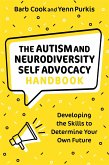Advocacy in Neurology
Herausgeber: Grisold, Wolfgang; Grisold, Thomas; Struhal, Walter
Advocacy in Neurology
Herausgeber: Grisold, Wolfgang; Grisold, Thomas; Struhal, Walter
- Broschiertes Buch
- Merkliste
- Auf die Merkliste
- Bewerten Bewerten
- Teilen
- Produkt teilen
- Produkterinnerung
- Produkterinnerung
Advocacy in Neurology offers a practical perspective on advocacy activities in neurology, aiming to show when and why they are important for neurology.
Andere Kunden interessierten sich auch für
![Transnational Advocacy in the Digital Era Transnational Advocacy in the Digital Era]() Nina Hall (Assistan Assistant Professor in International RelationsTransnational Advocacy in the Digital Era38,99 €
Nina Hall (Assistan Assistant Professor in International RelationsTransnational Advocacy in the Digital Era38,99 €![Advocacy Advocacy]() The City Law SchoolAdvocacy50,99 €
The City Law SchoolAdvocacy50,99 €![The Autism and Neurodiversity Self Advocacy Handbook The Autism and Neurodiversity Self Advocacy Handbook]() Barb CookThe Autism and Neurodiversity Self Advocacy Handbook28,99 €
Barb CookThe Autism and Neurodiversity Self Advocacy Handbook28,99 €![Preparing to Moot Preparing to Moot]() Sarah L. CooperPreparing to Moot58,99 €
Sarah L. CooperPreparing to Moot58,99 €![Critical Issues on Violence Against Women Critical Issues on Violence Against Women]() Critical Issues on Violence Against Women110,99 €
Critical Issues on Violence Against Women110,99 €![Feminist Advocacy Feminist Advocacy]() Andrea J. NicholsFeminist Advocacy124,99 €
Andrea J. NicholsFeminist Advocacy124,99 €![Political Advocacy and Its Interested Citizens Political Advocacy and Its Interested Citizens]() Matthew Dean HindmanPolitical Advocacy and Its Interested Citizens73,99 €
Matthew Dean HindmanPolitical Advocacy and Its Interested Citizens73,99 €-
-
-
Advocacy in Neurology offers a practical perspective on advocacy activities in neurology, aiming to show when and why they are important for neurology.
Hinweis: Dieser Artikel kann nur an eine deutsche Lieferadresse ausgeliefert werden.
Hinweis: Dieser Artikel kann nur an eine deutsche Lieferadresse ausgeliefert werden.
Produktdetails
- Produktdetails
- Verlag: Oxford University Press
- Seitenzahl: 396
- Erscheinungstermin: 28. April 2019
- Englisch
- Abmessung: 233mm x 154mm x 25mm
- Gewicht: 610g
- ISBN-13: 9780198796039
- ISBN-10: 019879603X
- Artikelnr.: 53936411
- Herstellerkennzeichnung
- Libri GmbH
- Europaallee 1
- 36244 Bad Hersfeld
- gpsr@libri.de
- Verlag: Oxford University Press
- Seitenzahl: 396
- Erscheinungstermin: 28. April 2019
- Englisch
- Abmessung: 233mm x 154mm x 25mm
- Gewicht: 610g
- ISBN-13: 9780198796039
- ISBN-10: 019879603X
- Artikelnr.: 53936411
- Herstellerkennzeichnung
- Libri GmbH
- Europaallee 1
- 36244 Bad Hersfeld
- gpsr@libri.de
Professor Wolfgang Grisold is a Neurologist at Ludwig Boltzmann Institute for Experimental and Clinical Traumatology, Vienna, Austria. His main research interests are in general neurology , neuro-oncology, palliative care, and neuromuscular disease. He has experience in hospital/institutional neurology and also general neurology and neuromuscular disease in private/office settings. Associate Professor Walter Struhal is a Neurologist and Chair of the Department of Neurology at University Clinic Tulln, Karl Landsteiner University of Health Sciences, Tulln, Austria. His main research interests are in neurointensive care medicine, neurodegenerative diseases, and the autonomic nervous system, as well as medical postgraduate education. Dr Thomas Grisold is a Research and Teaching Associate at Vienna University of Economics and Business, Vienna, Austria and he is studying a PhD in business and management. His main research interests are around the concept of organizational unlearning which refers to periods when organizations intentionally seek to get rid of established knowledge structures in order to create and implement new ones. Having a background in cognitive science, he aims to complement management research with interdisciplinary perspectives from neuroscience and philosophy.
* Section 1: What is advocacy?
* 1: Wolfgang Grisold, Walter Struhal, and Thomas Grisold: What is
advocacy?
* 2: Thomas Grisold and Oliver Lukitsch: Taking an epistemological
perspective on advocacy
* 3: Wolfgang Maderthaner and Wolfgang Grisold: Advocacy in history and
culture
* 4: Jan J. Heimans: Ethical issues in neurology
* 5: Tissa Wijeratne, Essie Low, and Christopher Neil: Physician,
autonomy, and pharmaceutical industry
* 6: Mohammad Wasay: Advocacy, campaigning , lobbying: Good or bad?
* Section 2: Why is advocacy needed?
* 7: Wolfgang Grisold: Knowledge and science is not enough
* 8: Mohammad Wasay: Perspectives on advocacy of medical doctors
* 9: Hanneke Zwinkels: Advocacy and the perspective of (neurology)
nursing
* 10: Helen Bulbeck: Patient and caregiver advocacy
* 11: Françoise Van Hemelryck: Patient involvement in European cancer
societies: The example of ECCO - the European CanCer Organization
* 12: Mustapha El Alaoui Faris: Advocacy for neurology in migrants
* 13: Apoorva Pauranik: Advocacy for neurology: Local, regional,
national
* 14: Raad Shakir: Advocacy in the international arena
* 15: Jes Olesen and Frédéric Destrebecq: Working with others, the
lesson of the European Brain Council
* 16: Richard Pichler: SOS children's villages: Re-discovering advocacy
to increase relevance and impact. A high level case study
* Section 3: What tools can be used for advocacy?
* 17: Walter Struhal and Thomas Grisold: Project management techniques
for advocates
* 18: Wolfgang Grisold, Anna Klicpera, and Thomas Grisold:
International advocacy: Case studies and lessons learnt
* 19: Birgit Kofler: Using PR tools for advocacy
* Section 4: Advocacy in different neurological diseases
* 20: Tissa Wijeratne, Sheila Crewther, and David Crewther: Advocacy
for stroke
* 21: Christoph Thalheim: Two decades of patient advocacy in Multiple
Sclerosis: The success story of the European MS Platform
* 22: Albert C. Ludolph: Advocacy in amyotrophic lateral sclerosis
* 23: Elaine C. Jones and John D. England: Neuromuscular disorders and
advocacy
* 24: Francesca Mancini and Carlo Colosimo: Advocacy for movement
disorders
* 25: Riccardo Soffietti, Christine Marosi, Roberta Rudà, and Wolfgang
Grisold: Advocacy for brain tumours
* 26: Gorazd B. Stokin: Advocacy in dementia
* 27: Fritz Zimprich: Advocating for orphan diseases in neurology
* 28: David Oliver: Palliative care
* 29: Jules C. Beal and Solomon L. Moshe: Advocacy for epilepsy: From
the shadows to centre stage: Stand up for epilepsy
* 30: Timothy J. Steiner and Jes Olesen: Advocacy for patients with
headache
* 31: Ligia Onofrei and A. Gordon Smith: Advocacy for patients with
neuropathic pain
* Section 5: Outlook, follow-up, results, ending, conclusion, and
debriefing
* 32: Wolfgang Grisold and Thomas Grisold: Continuation or ending and
'debriefing'
* 33: Wolfgang Grisold, Walter Struhal, and Thomas Grisold: Results,
outlook, and goals of this book
* 1: Wolfgang Grisold, Walter Struhal, and Thomas Grisold: What is
advocacy?
* 2: Thomas Grisold and Oliver Lukitsch: Taking an epistemological
perspective on advocacy
* 3: Wolfgang Maderthaner and Wolfgang Grisold: Advocacy in history and
culture
* 4: Jan J. Heimans: Ethical issues in neurology
* 5: Tissa Wijeratne, Essie Low, and Christopher Neil: Physician,
autonomy, and pharmaceutical industry
* 6: Mohammad Wasay: Advocacy, campaigning , lobbying: Good or bad?
* Section 2: Why is advocacy needed?
* 7: Wolfgang Grisold: Knowledge and science is not enough
* 8: Mohammad Wasay: Perspectives on advocacy of medical doctors
* 9: Hanneke Zwinkels: Advocacy and the perspective of (neurology)
nursing
* 10: Helen Bulbeck: Patient and caregiver advocacy
* 11: Françoise Van Hemelryck: Patient involvement in European cancer
societies: The example of ECCO - the European CanCer Organization
* 12: Mustapha El Alaoui Faris: Advocacy for neurology in migrants
* 13: Apoorva Pauranik: Advocacy for neurology: Local, regional,
national
* 14: Raad Shakir: Advocacy in the international arena
* 15: Jes Olesen and Frédéric Destrebecq: Working with others, the
lesson of the European Brain Council
* 16: Richard Pichler: SOS children's villages: Re-discovering advocacy
to increase relevance and impact. A high level case study
* Section 3: What tools can be used for advocacy?
* 17: Walter Struhal and Thomas Grisold: Project management techniques
for advocates
* 18: Wolfgang Grisold, Anna Klicpera, and Thomas Grisold:
International advocacy: Case studies and lessons learnt
* 19: Birgit Kofler: Using PR tools for advocacy
* Section 4: Advocacy in different neurological diseases
* 20: Tissa Wijeratne, Sheila Crewther, and David Crewther: Advocacy
for stroke
* 21: Christoph Thalheim: Two decades of patient advocacy in Multiple
Sclerosis: The success story of the European MS Platform
* 22: Albert C. Ludolph: Advocacy in amyotrophic lateral sclerosis
* 23: Elaine C. Jones and John D. England: Neuromuscular disorders and
advocacy
* 24: Francesca Mancini and Carlo Colosimo: Advocacy for movement
disorders
* 25: Riccardo Soffietti, Christine Marosi, Roberta Rudà, and Wolfgang
Grisold: Advocacy for brain tumours
* 26: Gorazd B. Stokin: Advocacy in dementia
* 27: Fritz Zimprich: Advocating for orphan diseases in neurology
* 28: David Oliver: Palliative care
* 29: Jules C. Beal and Solomon L. Moshe: Advocacy for epilepsy: From
the shadows to centre stage: Stand up for epilepsy
* 30: Timothy J. Steiner and Jes Olesen: Advocacy for patients with
headache
* 31: Ligia Onofrei and A. Gordon Smith: Advocacy for patients with
neuropathic pain
* Section 5: Outlook, follow-up, results, ending, conclusion, and
debriefing
* 32: Wolfgang Grisold and Thomas Grisold: Continuation or ending and
'debriefing'
* 33: Wolfgang Grisold, Walter Struhal, and Thomas Grisold: Results,
outlook, and goals of this book
* Section 1: What is advocacy?
* 1: Wolfgang Grisold, Walter Struhal, and Thomas Grisold: What is
advocacy?
* 2: Thomas Grisold and Oliver Lukitsch: Taking an epistemological
perspective on advocacy
* 3: Wolfgang Maderthaner and Wolfgang Grisold: Advocacy in history and
culture
* 4: Jan J. Heimans: Ethical issues in neurology
* 5: Tissa Wijeratne, Essie Low, and Christopher Neil: Physician,
autonomy, and pharmaceutical industry
* 6: Mohammad Wasay: Advocacy, campaigning , lobbying: Good or bad?
* Section 2: Why is advocacy needed?
* 7: Wolfgang Grisold: Knowledge and science is not enough
* 8: Mohammad Wasay: Perspectives on advocacy of medical doctors
* 9: Hanneke Zwinkels: Advocacy and the perspective of (neurology)
nursing
* 10: Helen Bulbeck: Patient and caregiver advocacy
* 11: Françoise Van Hemelryck: Patient involvement in European cancer
societies: The example of ECCO - the European CanCer Organization
* 12: Mustapha El Alaoui Faris: Advocacy for neurology in migrants
* 13: Apoorva Pauranik: Advocacy for neurology: Local, regional,
national
* 14: Raad Shakir: Advocacy in the international arena
* 15: Jes Olesen and Frédéric Destrebecq: Working with others, the
lesson of the European Brain Council
* 16: Richard Pichler: SOS children's villages: Re-discovering advocacy
to increase relevance and impact. A high level case study
* Section 3: What tools can be used for advocacy?
* 17: Walter Struhal and Thomas Grisold: Project management techniques
for advocates
* 18: Wolfgang Grisold, Anna Klicpera, and Thomas Grisold:
International advocacy: Case studies and lessons learnt
* 19: Birgit Kofler: Using PR tools for advocacy
* Section 4: Advocacy in different neurological diseases
* 20: Tissa Wijeratne, Sheila Crewther, and David Crewther: Advocacy
for stroke
* 21: Christoph Thalheim: Two decades of patient advocacy in Multiple
Sclerosis: The success story of the European MS Platform
* 22: Albert C. Ludolph: Advocacy in amyotrophic lateral sclerosis
* 23: Elaine C. Jones and John D. England: Neuromuscular disorders and
advocacy
* 24: Francesca Mancini and Carlo Colosimo: Advocacy for movement
disorders
* 25: Riccardo Soffietti, Christine Marosi, Roberta Rudà, and Wolfgang
Grisold: Advocacy for brain tumours
* 26: Gorazd B. Stokin: Advocacy in dementia
* 27: Fritz Zimprich: Advocating for orphan diseases in neurology
* 28: David Oliver: Palliative care
* 29: Jules C. Beal and Solomon L. Moshe: Advocacy for epilepsy: From
the shadows to centre stage: Stand up for epilepsy
* 30: Timothy J. Steiner and Jes Olesen: Advocacy for patients with
headache
* 31: Ligia Onofrei and A. Gordon Smith: Advocacy for patients with
neuropathic pain
* Section 5: Outlook, follow-up, results, ending, conclusion, and
debriefing
* 32: Wolfgang Grisold and Thomas Grisold: Continuation or ending and
'debriefing'
* 33: Wolfgang Grisold, Walter Struhal, and Thomas Grisold: Results,
outlook, and goals of this book
* 1: Wolfgang Grisold, Walter Struhal, and Thomas Grisold: What is
advocacy?
* 2: Thomas Grisold and Oliver Lukitsch: Taking an epistemological
perspective on advocacy
* 3: Wolfgang Maderthaner and Wolfgang Grisold: Advocacy in history and
culture
* 4: Jan J. Heimans: Ethical issues in neurology
* 5: Tissa Wijeratne, Essie Low, and Christopher Neil: Physician,
autonomy, and pharmaceutical industry
* 6: Mohammad Wasay: Advocacy, campaigning , lobbying: Good or bad?
* Section 2: Why is advocacy needed?
* 7: Wolfgang Grisold: Knowledge and science is not enough
* 8: Mohammad Wasay: Perspectives on advocacy of medical doctors
* 9: Hanneke Zwinkels: Advocacy and the perspective of (neurology)
nursing
* 10: Helen Bulbeck: Patient and caregiver advocacy
* 11: Françoise Van Hemelryck: Patient involvement in European cancer
societies: The example of ECCO - the European CanCer Organization
* 12: Mustapha El Alaoui Faris: Advocacy for neurology in migrants
* 13: Apoorva Pauranik: Advocacy for neurology: Local, regional,
national
* 14: Raad Shakir: Advocacy in the international arena
* 15: Jes Olesen and Frédéric Destrebecq: Working with others, the
lesson of the European Brain Council
* 16: Richard Pichler: SOS children's villages: Re-discovering advocacy
to increase relevance and impact. A high level case study
* Section 3: What tools can be used for advocacy?
* 17: Walter Struhal and Thomas Grisold: Project management techniques
for advocates
* 18: Wolfgang Grisold, Anna Klicpera, and Thomas Grisold:
International advocacy: Case studies and lessons learnt
* 19: Birgit Kofler: Using PR tools for advocacy
* Section 4: Advocacy in different neurological diseases
* 20: Tissa Wijeratne, Sheila Crewther, and David Crewther: Advocacy
for stroke
* 21: Christoph Thalheim: Two decades of patient advocacy in Multiple
Sclerosis: The success story of the European MS Platform
* 22: Albert C. Ludolph: Advocacy in amyotrophic lateral sclerosis
* 23: Elaine C. Jones and John D. England: Neuromuscular disorders and
advocacy
* 24: Francesca Mancini and Carlo Colosimo: Advocacy for movement
disorders
* 25: Riccardo Soffietti, Christine Marosi, Roberta Rudà, and Wolfgang
Grisold: Advocacy for brain tumours
* 26: Gorazd B. Stokin: Advocacy in dementia
* 27: Fritz Zimprich: Advocating for orphan diseases in neurology
* 28: David Oliver: Palliative care
* 29: Jules C. Beal and Solomon L. Moshe: Advocacy for epilepsy: From
the shadows to centre stage: Stand up for epilepsy
* 30: Timothy J. Steiner and Jes Olesen: Advocacy for patients with
headache
* 31: Ligia Onofrei and A. Gordon Smith: Advocacy for patients with
neuropathic pain
* Section 5: Outlook, follow-up, results, ending, conclusion, and
debriefing
* 32: Wolfgang Grisold and Thomas Grisold: Continuation or ending and
'debriefing'
* 33: Wolfgang Grisold, Walter Struhal, and Thomas Grisold: Results,
outlook, and goals of this book









